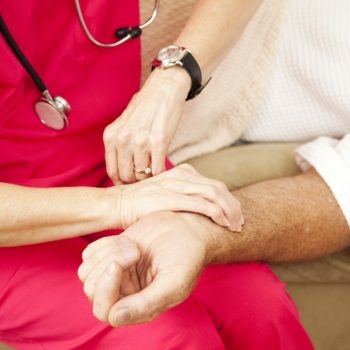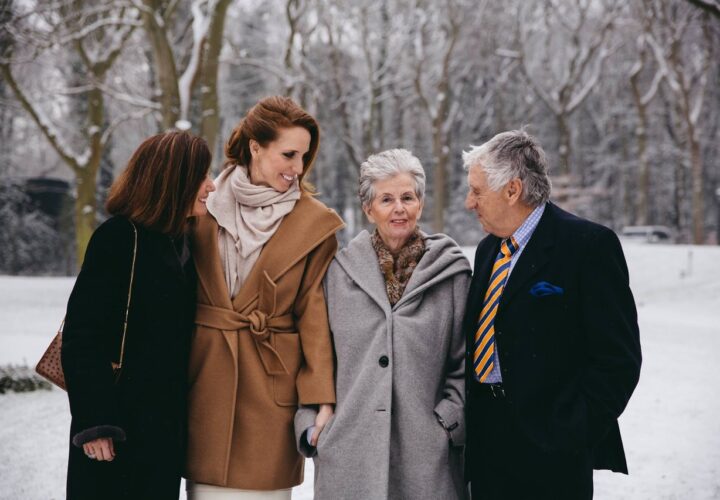My stepfather, a retired army colonel, retained his military precision with time, language and behavior more than two decades after he retired. Even in his 80s, everyone from his own children to the drugstore clerk addressed him as “Colonel.” The only exception was my mom, who affectionately called him “TC” for—you guessed it—”The Colonel.”
When he developed problems with cognition, memory and fine motor tasks, he was unsurprisingly not a man who could be easily influenced to seek medical care. By the time he was correctly diagnosed with normal pressure hydrocephalus related dementia, his daily life had been impacted, my mom guessed, for at least a few years. A shunt that drained off cerebrospinal fluid provided some improvement in symptoms but was of no long term help.
After he had a particularly bad fall and refused to eat as long as he was in the rehab facility (you don’t live through three wars without learning a thing or two about the effectiveness of hunger strikes) my mom arranged his discharge. I came to help her set up the logistics of caring for him at home.
When I arrived I was not surprised to discover that while the Colonel was cognitively changed, he was emotionally the same: proud, exceedingly stubborn and brave. Now instead of unflinchingly dodging bullets, he was dealing with memory loss and the fact that he needed help from my mom to complete everyday tasks.
“Getting older isn’t for wimps,” my mom would say on hard days.
“You got that right, soldier,” Colonel agreed. “You’ve got that right.”
I was surprised, however, that my mom had not yet enrolled Colonel in home hospice care even though he had been deemed eligible by his providers, who predicted, based on his recent falls, difficulty with speech and activity of daily living, that he was likely to die within six months and possibly much sooner. She shrugged and said, “It isn’t time yet.”
“Um, Mom, if not now, um, when?” I asked, confused, but wanting to tread lightly.
My mom sighed loudly. “That’s weird—those are the exact words the neurologist said.”
My parents were not alone in their decision. Hospice cares for less than 40 percent of dying patients in the US, and most patients who enroll do so when they are very close to death: The average length of use of hospice is three weeks and 1 out of 10 patients enroll on their last day of life. Entry into hospice very close to the time of death often means hospice care is not as effective and can make end of life more difficult for both patients and caregivers. Late entry impacts the effectiveness of pain control, for example, and understanding and preparation for the death process.
I didn’t know what the research said at that time, I only knew that six months previous to this conversation, my own partner had died after a protracted struggle with ovarian cancer. When she finally made the decision to stop treatment that wasn’t helping her and was instead making her sicker, she said, “Get me hospice on the phone.” The day the nurse came to do her intake, we were so relieved that immediately after the nurse left we both immediately fell into a deep sleep on the couch. Having home hospice care made a huge difference in our daily lives, and drastically improved our last few months together. My partner had improved pain control, access to 24/7 nursing help when needed, and a chaplain who had worked with many other critically ill young people. I had access to extensive emotional support before and after her death.
My mom, however, was worried that no matter how hospice could logistically improve their lives, making the choice would ultimately be negative because, as she put it, “it will make Colonel think I’m giving up on him.”
This concern seems to be a normal one and partly stems from misconceptions about what it means to choose hospice care. Choosing hospice care doesn’t mean that the patient will no longer receive medical care. Instead, medical care will be focused on making the patient comfortable and able to engage in the activities that are important to them, rather than focusing on curing their medical condition.
Choosing hospice care also doesn’t mean that patients must go into an institution; almost 50 percent of hospice patients are able to be cared for at home. It also doesn’t mean that the patient or family can’t change their mind; if a patient’s condition improves or they wish to return to cure focused treatment, they can be discharged from the hospice at any time. They can also choose to still receive care from their primary care provider with whom they have a relationship.
The decision of when and if to seek hospice care is a very individual one and how you access hospice care can vary depending on a specific patient’s prognosis, insurance and other factors. It can be really scary to even consider the possibility, but in order to make the best choice about hospice, it’s important to obtain accurate information, free of assumptions or or misinformation.
As for my mom, she didn’t immediately make the move toward hospice, but a few weeks later she spent time with Colonel explaining the need and process for hospice. Although he was beyond verbal communication at that time, she believed he was ready. She took his hand while the intake nurse asked her questions.
Later that day as we prepared dinner together, she said, “I guess it’s not so much giving up. It’s more like giving in to the next phase of life. And making the best of the days we have together.”
Kelli Dunham is a nurse, stand-up comic and author of seven books of health-related nonfiction including the bestselling “Boy’s Body Book” and “Girl’s Body Book,” both now in their fourth editions. Her writing has appeared New Republic, LadyScience, Them.us, Time.com, Lady Science, Refinery29, XOJane, Thought Catalog, Autostraddle and the NPR health blog. She is also the founder of Organ Recital: A Festival of Stories About Bodies, Health & Healthcare and is hard at work at “Ouch That Hurts,” an irreverent self-help book about grief.




I agree that the choice to do hospice is a very individual one and it varies from person to person. It’s a hard choice to make but I think it’s better in the long run. My dad has been thinking about getting hospice for my grandpa.